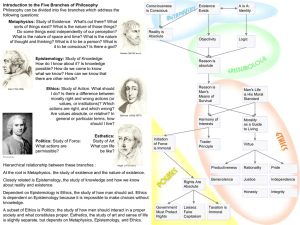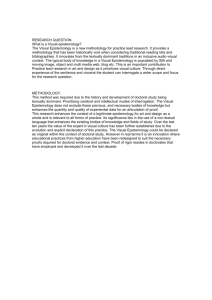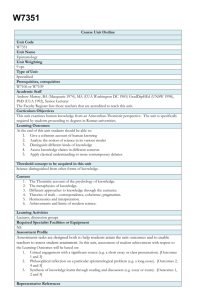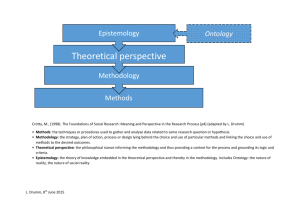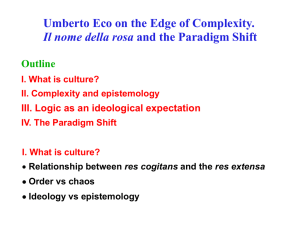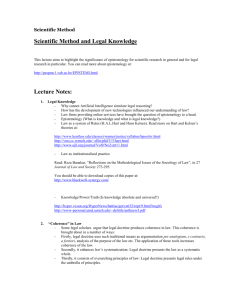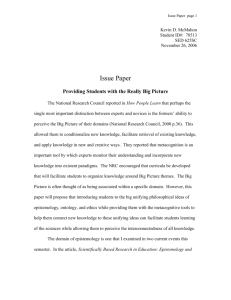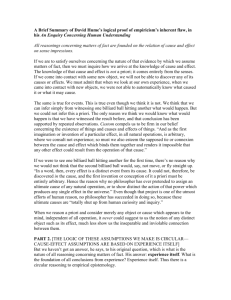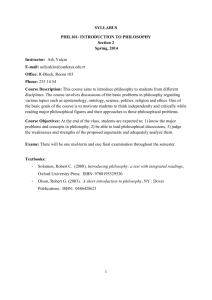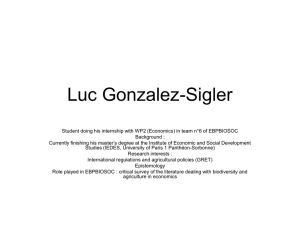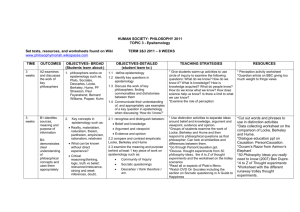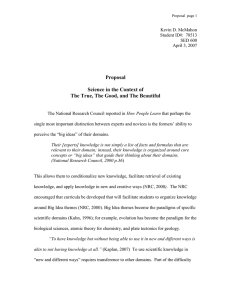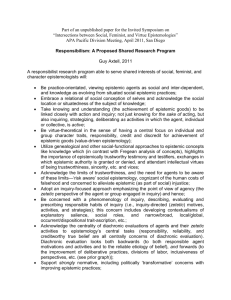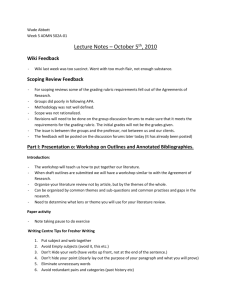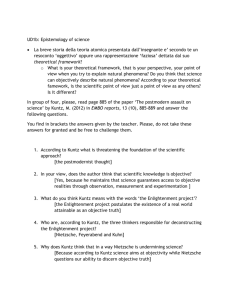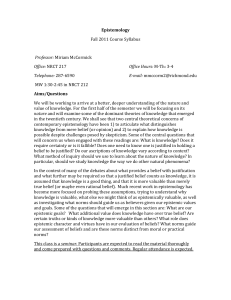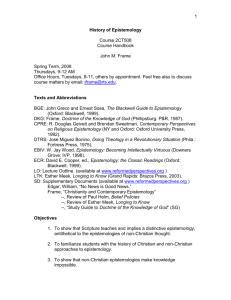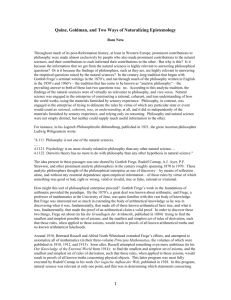PHIL 1a: Introduction to Philosophy
advertisement
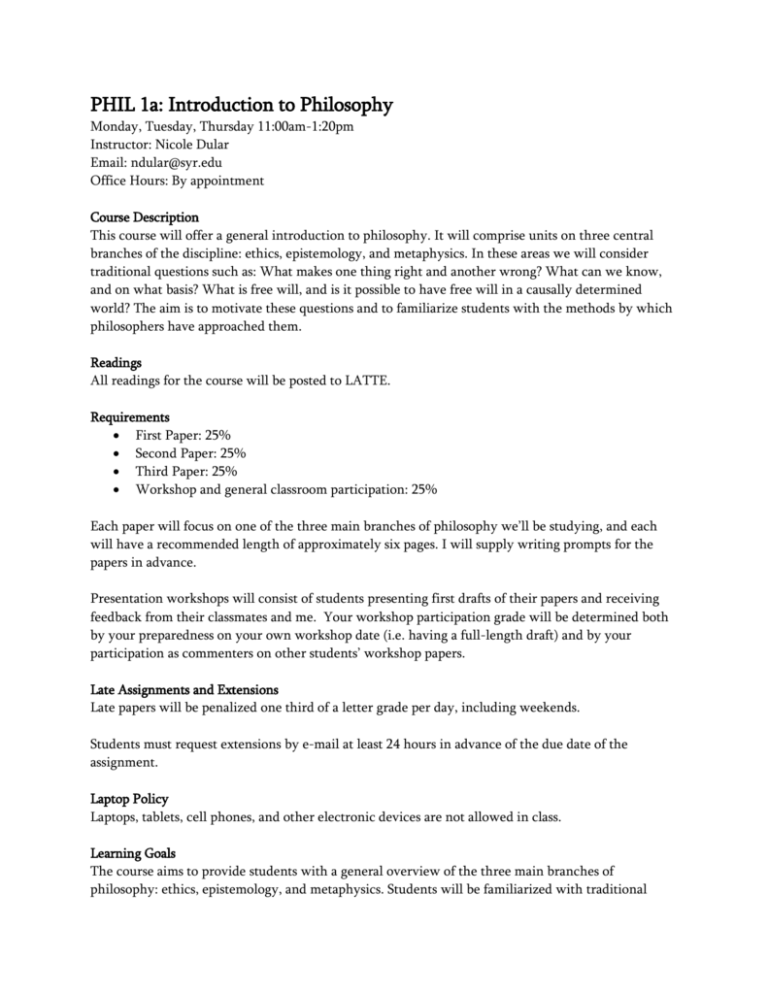
PHIL 1a: Introduction to Philosophy Monday, Tuesday, Thursday 11:00am-1:20pm Instructor: Nicole Dular Email: ndular@syr.edu Office Hours: By appointment Course Description This course will offer a general introduction to philosophy. It will comprise units on three central branches of the discipline: ethics, epistemology, and metaphysics. In these areas we will consider traditional questions such as: What makes one thing right and another wrong? What can we know, and on what basis? What is free will, and is it possible to have free will in a causally determined world? The aim is to motivate these questions and to familiarize students with the methods by which philosophers have approached them. Readings All readings for the course will be posted to LATTE. Requirements First Paper: 25% Second Paper: 25% Third Paper: 25% Workshop and general classroom participation: 25% Each paper will focus on one of the three main branches of philosophy we’ll be studying, and each will have a recommended length of approximately six pages. I will supply writing prompts for the papers in advance. Presentation workshops will consist of students presenting first drafts of their papers and receiving feedback from their classmates and me. Your workshop participation grade will be determined both by your preparedness on your own workshop date (i.e. having a full-length draft) and by your participation as commenters on other students’ workshop papers. Late Assignments and Extensions Late papers will be penalized one third of a letter grade per day, including weekends. Students must request extensions by e-mail at least 24 hours in advance of the due date of the assignment. Laptop Policy Laptops, tablets, cell phones, and other electronic devices are not allowed in class. Learning Goals The course aims to provide students with a general overview of the three main branches of philosophy: ethics, epistemology, and metaphysics. Students will be familiarized with traditional approaches to these fields, and will learn how to think critically both about the subject matter of those fields and about whether traditional approaches to the subject matter are apt. The course also aims to sharpen students’ academic writing skills. Students will be exposed to works by leading authors in contemporary academic philosophy. Assignments will be graded partly on the basis of writing quality; emphasis will be placed on good writing in addition to comprehension of and critical engagement with course material. Academic Dishonesty Academic dishonesty will be reported to the Department of Student Development and Conduct. If you have questions regarding what constitutes academic dishonesty, please do not hesitate to ask me. It is not dishonest to ask others to read and comment on your papers, but all writing assignments must be in your own words. More information can be found on the Brandeis web site at the following address: http://www.brandeis.edu/studentaffairs/srcs/index.html Disability If you are a student with a documented disability on record Brandeis and need to have special accommodations for this class, please see me immediately. I am very happy to make the relevant arrangements. Schedule of Readings 7/7 Introduction; Basic argumentation and Fallacies 7/8 Ethics: Consequentialism John Stuart Mill Utilitarianism Ch. 1, 2, 4 7/10 Ethics: Consequentialism’s Critics J.J.C. Smart, “Extreme and Restricted Utilitarianism” Judith Jarvis Thomson, “The Trolley Problem” Bernard Williams, “A Critique of Utilitarianism” sections 3, 4, and 5 7/14 Ethics: Famine Case Study Onora O’Neill, “The Moral Perplexities of Famine Relief” Sections I and II Peter Singer, “Famine, Affluence, and Morality” Virginia Held The Ethics of Care: Personal, Political, and Global Ch. 1 p.9-13 Lisa Cassidy, “Starving Children in Africa: Who Cares?” 7/15 Ethics Workshop 7/17 Epistemology: What is knowledge? Linda Zagzebski, “What is Knowledge?” Plato, “Meno” Edmund Gettier “Is Knowledge Justified True Belief?” 7/18 Epistemology: Skepticism Keith DeRose and Ted Warfield Skepticism: A Contemporary Reader Ch. 1 Hilary Putnam “Brains in a Vat” G.E. Moore “Proof of an External World” 7/21 Epistemology: Testimony Elizabeth Fricker, “Testimony and Epistemic Autonomy” Jennifer Lackey, “Testimonial Knowledge and Transmission” 7/22 Epistemology: Feminist Epistemology Miranda Fricker Epistemic Injustice Ch. 1 Rae Langton, “Feminism in Epistemology” 7/28 Epistemology Workshop 7/29 Free Will: Determinism David Hume “The Obviousness of the Truth of Determinism” Paul Holbach “The Illusion of Free Will” Patricia Churchland “Is Determinism Self-refuting?” 7/31 Free Will: Indeterminism Roderick Chisholm “Human Freedom and the Self” Dana Nelkin “The Sense of Freedom” 8/4 Free Will: Moral Responsibility Susan Wolf “Sanity and the Metaphysics of Responsibility” Harry Frankfurt “Alternate Possibilities and Moral Responsibility” 8/5 Free Will Workshop Schedule of Assignments 7/18 Ethics Paper Due 8/1 8/7 Epistemology Paper Due Free Will Paper Due

